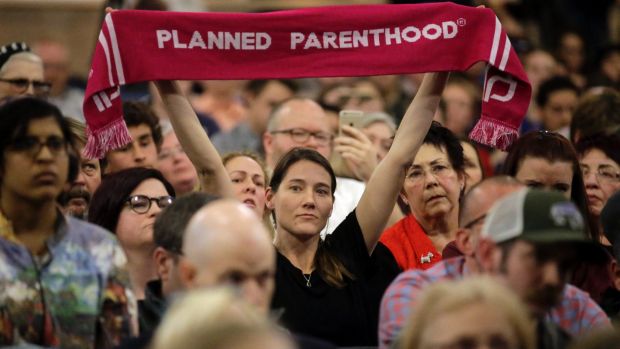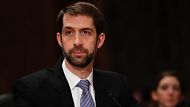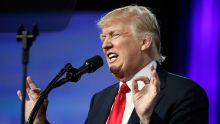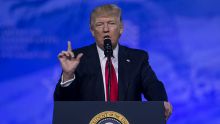The US Congress is in recess this week and Americans suddenly spurred to action after the election of Donald Trump used the opportunity to let their returning lawmakers know just how they feel about the tempestuous past month in Washington.
They came by the hundreds, in big cities and rural hamlets, to heckle, plead, badger and, in some instances, to protest the protests themselves.
More World News Videos
Seven-year-old boy grills senator
Republican leaders in the US are facing angry citizens demanding answers in town hall meetings across the country.
Of all the citizens, one in Springdale, Arkansas, received possibly the most applause.
Toby Smith – age 7 "but almost 8" – told Senator Cotton that he found President Donald Trump's comments about Mexico concerning.

Arkansas town hall crowd erupts at Sen. Tom Cotton https://t.co/CFbFG4oU8c pic.twitter.com/qV6v0yV5qN
— CNN (@CNN) February 23, 2017
"Donald Trump makes Mexicans not important to people who are in Arkansas who like Mexicans," Toby said, pointing out that those Arkansans include himself and his grandma. Crucially for Toby, too, Mr Trump's proposed border with Mexico wall posed a threat to PBS Kids and the national parks.
"He is deleting all the parks and PBS Kids just to make a wall," Toby said, "and he shouldn't do that. He shouldn't do all that stuff just for the wall."
Under a possible Mr Trump administration plan to shrink federal spending, reported in January, the Corporation for Public Broadcasting would be privatised, an organisation allocates funds to nonprofit television and radio stations through NPR and the Public Broadcasting Service which includes PBS Kids. There was also concern that a federal hiring freeze would hit the National Park Service particularly hard, as the parks rely on finding seasonal help during the summer. On Monday the Park Service learned that the summer hires would be exempt.

Mr Cotton thanked Toby for coming and said, "We are a melting pot. We are all one people."
"We want Mexico to be a healthy, strong partner," said the senator, adding he wanted to see the US help Mexico with its crime and drug cartel problems. "But we also have to protect our own citizens, and that's where the wall comes in."
The proposed wall along the Mexico border was recently estimated to cost $21.6 billion over more than three years.
Obamacare, immigration, environmental regulation, Social Security, Russian meddling in the 2016 election and Trump, Trump, Trump – all poured forth this week in the form of questions, loudly and heatedly.
In places like Springdale High School auditorium, in the Arkansas Ozarks, that unrelenting America erupted like a white-hot Yellowstone geyser. There, on Wednesday, conservative Republican Senator Tom Cotton fielded questions from concerned citizens.
One woman told Mr Cotton that, were it not for the Affordable Care Act, three members of her family would be dead.
"I am an angry constituent," the woman said. "You work for us." She implored the senator to meet with her family to hear her story.
Some attendees at the meetings across America specifically credited Trump for their attendance.
Jennifer Bruns, 49, joined her husband and their two teenage sons at Democratic Representative Brad Schneider's suburban Chicago town hall, which vastly overflowed the 225-seat Northbrook library. She was apolitical before November 8.
Mr Trump's election "absolutely lit a fire under my butt, not just to take interest," Ms Bruns said, "but that I have a responsibility to do whatever I can to make sure our values stay in place."
Mr Trump weighed in on the town hall meetings via Twitter, suggesting they were planned by "liberal activists".
The so-called angry crowds in home districts of some Republicans are actually, in numerous cases, planned out by liberal activists. Sad!
— Donald J. Trump (@realDonaldTrump) February 21, 2017
The raucous gatherings have been the mirror image of the clamorous sessions that birthed the tea party movement early in President Barack Obama's term, a conservative opposition that tormented him – and sometimes the GOP establishment – throughout his eight years in office.
In central Florida, Republican Representative Dennis A. Ross learned that being re-elected a third time with 58 per cent of the vote did not guarantee a friendly crowd. Appearing before about 250 people and a comfort dog, Ross dodged questions, catcalls and boos before exiting just shy of his scheduled hour appearance.
The last question had three parts: about the expense to taxpayers of President Donald Trump's frequent Florida visits, about his seemingly fondness for Russia and about the president's still-unseen tax returns.
"This is the first anyone has brought that to my attention," Mr Ross said of the reported $US10 million it cost to shuttle Mr Trump for three trips between Washington and his Palm Beach resort.
The boos were so hearty and long that the rest of Mr Ross' answer could not be heard, though one word was audible – "Hawaii," likely a reference to where Mr Obama vacationed.
Then the congressman quickly hustled out the back door to a chant of "Do your job!", the unofficial rallying cry for those who consider the Republican-run Congress too pliant toward the president.
Angry crowd shouts down GOP Sen. Bill Cassidy at Louisiana town hall pic.twitter.com/rYIZF6E4g7
— RogelioGarcia Lawyer (@LawyerRogelio) February 23, 2017
For Representive Buddy Carter, a two-term GOP lawmaker representing a staunchly conservative stretch of coastal Georgia, the boos began as soon as he tried to present plans to replace the Affordable Care Act.
More than 300 people, many wearing Planned Parenthood T-shirts and waving pink and purple paper hearts, squeezed into a college auditorium in Savannah for the standing-room-only event. Outside, scores more chanted, "Let us in!"
The crowd erupted in jeers as Mr Carter displayed a slide titled "Broken Obamacare Promises."
"Affordable Care Act!" a chorus of voices yelled, objecting to the use of the Republican pejorative for Obama's signature health care law.
"You know about the promises and you know about the reality," Mr Carter told constituents, saying that annual health care premiums had risen $US4,300 for the average family.
"Look, folks, Obamacare is collapsing," Mr Carter said.
"You collapsed it!" a man in the audience hollered back, and the crowd roared.
An earlier round of town halls this month produced a number of screaming spectacles, prompting many Republican lawmakers to scrub their latest recess schedules of any such face-to-face encounters.
Some preferred to conduct safer "telephonic town halls," where participants were screened and no cameras threatened to turn confrontation into the internet's next big viral moment.
Others skipped meeting with constituents altogether; in California, the liberal group Indivisible circulated milk cartons bearing the word "missing" and the face of Republican Represenative Paul Cook, a three-term congressman.
Chuck Grassley asked about impeachment of Trump at town hall in Garner, Iowa pic.twitter.com/HQ3js0iVEb
— RogelioGarcia Lawyer (@LawyerRogelio) February 22, 2017
Democrats were far more eager to lend critics of the president and GOP lawmakers a prominent platform.
For some people, the gatherings were akin to therapy, or a group session on translating grief into action.
"Sign people up, get people involved," Democratic Representative Tony Cardenas, exhorted a crowd of 300 crammed into an auditorium at the Cesar E. Chavez Learning Academies in Los Angeles' heavily Democratic San Fernando Valley.
"Register people to vote, beg other people who are citizens, 'Please vote,'" Mr Cardenas said. "The more people who vote, the better the results are."
In Mariposa, a small tourist way station on the road to Yosemite, the audience included hundreds who turned out in support of the president and Republican Representative Tom McClintock, who left his last town hall, this month outside Sacramento, under police escort.
Owen Swart, 58, came wearing a National Rifle Association ball cap and "Infidel" T-shirt declaring his love of both pork and guns. "If that offends you," his shirt read, "I'll help you pack."
It was important, Mr Swart said, to show that the liberal marchers who flooded the streets after Mr Trump's inauguration and those questioning the president's legitimacy - and sanity - don't speak for him or those he knows.
"We may not make as much noise and have signs," said Mr Swart, a financial adviser in Modesto, "but we work hard and we vote."
About 900 people showed up in an auditorium at the Mariposa fairground, more than 10 times the usual attendance for a McClintock town hall and better than a third the local population. He drew an immediate burst of applause by dispensing with opening remarks. "This evening is yours," McClintock said, "so have at it."
Republican Rep. Tom Reed met with chorus of boos as he discusses repealing Obamacare at town hall: https://t.co/Ob8D9pdCla pic.twitter.com/c92uYCb9eZ
— ABC News (@ABC) February 18, 2017
And the audience did, for more than twice the hour he had scheduled.
He was grilled about repealing Obamacare and promising the replacement would be even better.
"What's the plan?" voices cried out. "Show us a bill!"
He was mocked for questioning the science behind global warming.
"The planet has been warming on and off since the last ice age," Mr McClintock said to hoots and laughter.
He was ridiculed for likening Mr Trump to the robust Presidents Andrew Jackson and Theodore Roosevelt, and taunted for minimising the contacts between Trump allies and the Russian government.
"I think you will find votes I have cast have the support of the vast majority of people in this district," said Mr McClintock, who was easily re-elected in November to a fifth term. "The moment they don't, there'll be somebody else standing here."
"Good idea," someone shouted.
But even some of the harshest questions were prefaced with thanks for McClintock's willingness to show up early and stay late.
"God bless all of you for being here," he said at one point after a woman in the audience said the huge turnout was a show of resistance to Mr Trump. (In fact, about a third or so of the crowd appeared strongly supportive of the president.)
The big question is whether the outpouring at town halls, the circuit-jamming phone calls to Capitol Hill, the email- and letter-writing campaigns are the start of a meaningful political movement or merely an angry spasm. The answer is unknowable until the next nationwide election in November 2018.
Mr McClintock offered this bit of advice on meeting with constituents in the meantime.
"If you're going to do it," he said, "get the biggest room you can."
Los Angeles Times, The Washington Post














